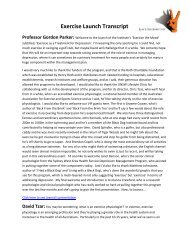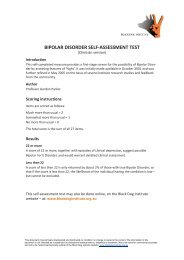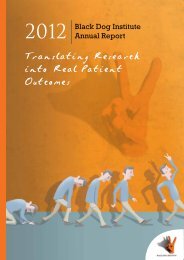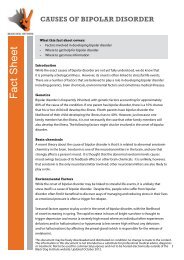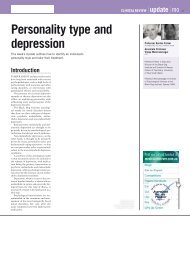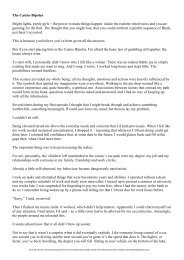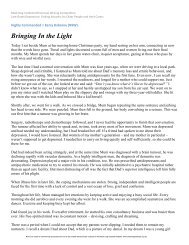Sink or swim - Black Dog Institute
Sink or swim - Black Dog Institute
Sink or swim - Black Dog Institute
Create successful ePaper yourself
Turn your PDF publications into a flip-book with our unique Google optimized e-Paper software.
astray, drinking half a bottle of Vat 69. Partying and pillow fights got out of<br />
hand, some athletes trashed rooms."<br />
After winning one gold and two bronze at the 1960 Rome Olympics, Konrads<br />
relished both being a celebrity and having one drink too many. "I liked mixing<br />
with famous and influential people, I liked the good life. I'd get on a high, and<br />
the m<strong>or</strong>e I drank, the higher I'd go, and John's the life of the party again,<br />
playing the clown, the naughty boy, flirting.<br />
"It got in the way of my fitness, and maybe I would have been a greater<br />
<strong>swim</strong>mer and my career would have lasted longer if it hadn't."<br />
Konrads spoke to Good Weekend with such acute openness that Don Talbot,<br />
when told this, w<strong>or</strong>ried that the lad he'd coached from age 11 was being too<br />
harsh on himself.<br />
Talbot's gravelly voice became emotional and emphatic: "John's hardly the<br />
only one who got into trouble. His parents didn't have a clue how to deal with<br />
the pressures and subtleties of being an elite athlete. I had a whole squad of<br />
<strong>swim</strong>mers to look after.<br />
"John has always been an extremely capable and talented person, who<br />
wanted to push himself. He's a very likeable, generous and compassionate<br />
man. He was the most articulate and sociable of the <strong>swim</strong>mers of his time, but<br />
probably too handsome and too much of a party-goer f<strong>or</strong> his own good.<br />
"But remember, <strong>swim</strong>mers in John's day were unpaid amateurs who did it f<strong>or</strong><br />
the gl<strong>or</strong>y of sp<strong>or</strong>t and a pat on the back. Financially, they ended up with the<br />
arse out of their pants! They didn't have business managers, personal<br />
managers, psychologists, scientists, <strong>or</strong> any of the entourage of professional<br />
help that elite athletes get today. John only had me - a juni<strong>or</strong> coach, eight<br />
years older than he was."<br />
Talbot did a master's in psychology at age 45, because he came to realise<br />
how vital the psychological side is, both in the perf<strong>or</strong>mance of champions and<br />
in the transitional help they should be given when they retire. "Suddenly the<br />
dominant part of their life and identity ... the training routine, coach barking at<br />
them, the discipline, competing, being the centre of attention, the euph<strong>or</strong>ia of<br />
winning, cheering of the crowd ... it's all gone.<br />
"The crucial problem with fame is the higher you go, the m<strong>or</strong>e dangerous the<br />
fall.<br />
If you don't know how to handle fame <strong>or</strong> don't get the right help, then loss of<br />
fame can destroy you."<br />
If the amateurs of that era had been allowed to earn money from their talent,<br />
treat it as a career and hire personal managers, would Konrads and others<br />
http://www.blackdoginstitute.<strong>or</strong>g.au/



